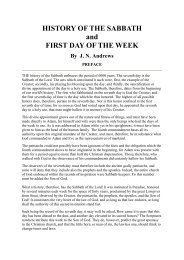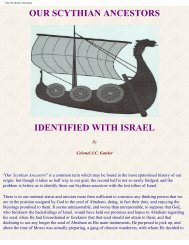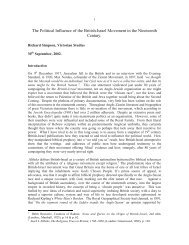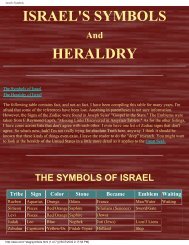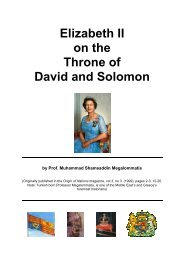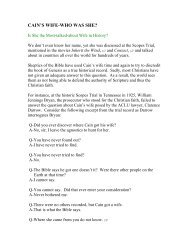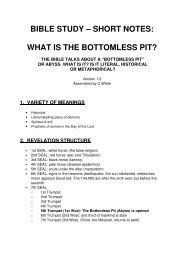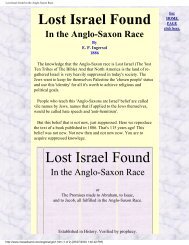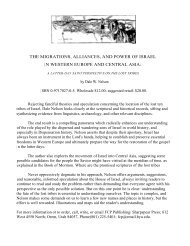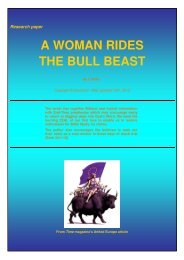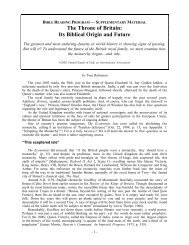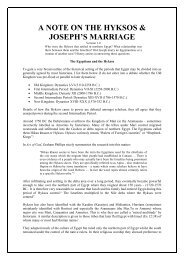King Alfred the Great and Our Common Law - The Works of F. N. Lee
King Alfred the Great and Our Common Law - The Works of F. N. Lee
King Alfred the Great and Our Common Law - The Works of F. N. Lee
- No tags were found...
Create successful ePaper yourself
Turn your PDF publications into a flip-book with our unique Google optimized e-Paper software.
KING ALFRED THE GREAT AND OUR COMMON LAWby <strong>King</strong> <strong>Alfred</strong>'s own adaptation <strong>of</strong> those Old-Israelitic case laws to meet <strong>the</strong> differentconditions <strong>of</strong> early-mediaeval Anglo-Saxon Britain. Compare, for example, <strong>Alfred</strong>'s ownlaws 11 & 27 & 44-47. Yet, in so adapting, <strong>King</strong> <strong>Alfred</strong> clearly preserves <strong>and</strong> enforceswithin English <strong>Common</strong> <strong>Law</strong> <strong>the</strong> general equity <strong>of</strong> those Old-Israelitic judicial laws.To prove this — just compare <strong>the</strong> statements <strong>of</strong> Mosaic <strong>Law</strong> with <strong>Alfred</strong>'s Anglo-British <strong>Common</strong> <strong>Law</strong> <strong>and</strong> also with <strong>the</strong> Westminster Confession <strong>of</strong> Faith <strong>and</strong> <strong>the</strong>Westminster Larger Catechism. For <strong>the</strong> New Testament itself — at Mat<strong>the</strong>w 5:5-21f &First Timothy 5:17-21 etc., presupposes inter alia Exodus 20:1 to 23:9f in <strong>the</strong> OldTestament. <strong>Alfred</strong> cites Exodus 20:1 to 23:9 — as well as Mat<strong>the</strong>w 5:17-19 & 7:1-12 <strong>and</strong>Acts 11:19-26f & 15:20-29 & 16:4-5. <strong>The</strong> Westminster Confession (19:4f) cites Exodus21:1 to 22:29, as well as Mat<strong>the</strong>w 5:17f <strong>and</strong> First Corinthians 9:8-10 etc.After recording Exodus 20:1 to 23:9, <strong>King</strong> <strong>Alfred</strong> declares: "<strong>The</strong>se are judgmentswhich Almighty God Himself spoke to Moses <strong>and</strong> comm<strong>and</strong>ed him to keep. Now, since<strong>the</strong> Lord's only begotten Son our God <strong>and</strong> healing [Saviour] Christ has come to MiddleEarth [alias <strong>the</strong> 'Mediterranean World'] — He said that He did not come to break nor t<strong>of</strong>orbid <strong>the</strong>se comm<strong>and</strong>ments but to approve <strong>the</strong>m well, <strong>and</strong> to teach <strong>the</strong>m with allmildheartedness <strong>and</strong> lowlymindedness." Mat<strong>the</strong>w 5:5-19 cf. <strong>the</strong> Westminster Confession<strong>of</strong> Faith 19:5."<strong>The</strong>n, after His throes [or 'sufferings'], before His Apostles had gone throughout <strong>the</strong>Earth to teach, <strong>and</strong> while <strong>the</strong>y were yet toge<strong>the</strong>r — <strong>the</strong>y turned many hea<strong>the</strong>n nations toGod. While <strong>the</strong>y were all toge<strong>the</strong>r, <strong>the</strong>y sent err<strong>and</strong>-writing to Antioch <strong>and</strong> to Syria —<strong>the</strong>re to teach Christ's <strong>Law</strong> [cf. Acts 11:19-26f].... This is <strong>the</strong>n that err<strong>and</strong>-writing which<strong>the</strong> Apostles sent to Antioch <strong>and</strong> to Syria <strong>and</strong> to Cilicia, which is meet for <strong>the</strong> hea<strong>the</strong>nnations turned to Christ [cf. Acts 15:20 & 16:4-5]:"'<strong>The</strong> Apostles <strong>and</strong> Elder Brethren wish you health! Now we make known to you, thatwe have heard that some <strong>of</strong> our fellows have come to you with our words, <strong>and</strong> that <strong>the</strong>yhave comm<strong>and</strong>ed you to bear a heavier way [or 'law'] than we enjoined, <strong>and</strong> that <strong>the</strong>yhave too much misled you with manifold injunctions, <strong>and</strong> have more perverted thancorrected your souls. So we assembled ourselves about this. <strong>The</strong>n, to all <strong>of</strong> us it seemedright that we should send [to you] Paul <strong>and</strong> Barnabas – men who will give <strong>the</strong>ir lives for<strong>the</strong> Name <strong>of</strong> <strong>the</strong> Lord. With <strong>the</strong>m, we send Judas <strong>and</strong> Silas, so that <strong>the</strong>y may say <strong>the</strong> sameto you.'"<strong>Alfred</strong> <strong>the</strong>n shows that also <strong>the</strong> Apostles, such as Paul <strong>and</strong> Barnabas (cf. Acts 14:4-14f), clearly upheld <strong>the</strong> 'general equity' <strong>of</strong> <strong>the</strong> <strong>Law</strong> <strong>of</strong> God. Explained <strong>the</strong> Apostles: "'Itseems good to <strong>the</strong> Holy Ghost <strong>and</strong> to us, that we should not impose any burden upon youbeyond that which was needful to hold — that is, <strong>the</strong>n, that you should refrain fromworshipping devil-gilds [or 'idols'], <strong>and</strong> from tasting blood <strong>and</strong> stranglings, <strong>and</strong> fromfornication!'" See: Acts 15:23-29 <strong>and</strong> cf. Exodus 20:2-17.For it needs to be remembered that <strong>Alfred</strong> had already: first re-enjoined <strong>the</strong> Decalogueor <strong>the</strong> Ten Comm<strong>and</strong>ments (Exodus 20:1-17); <strong>the</strong>n illustrated <strong>the</strong>ir concrete applicationby way <strong>of</strong> case law (Exodus 21:1 to 23:9); <strong>and</strong> next assured his readers that Christ had- 7 -
KING ALFRED THE GREAT AND OUR COMMON LAWnot come to break <strong>the</strong> Ten Comm<strong>and</strong>ments, but to approve <strong>the</strong>m well (Mat<strong>the</strong>w 5:5-19).Indeed, <strong>Alfred</strong> had <strong>the</strong>n gone on, toge<strong>the</strong>r with all <strong>of</strong> Christ's Twelve Apostles, to enjoin— representatively from <strong>the</strong> Decalogue — respectively <strong>the</strong> Second <strong>and</strong> <strong>the</strong> Sixth <strong>and</strong> <strong>the</strong>Seventh Comm<strong>and</strong>ments in <strong>the</strong> Second Table <strong>of</strong> God's <strong>Law</strong> for man. This is seen quiteclearly in <strong>the</strong> apostolic prohibitions enjoining abstinence from idolatry, bloodshed <strong>and</strong>fornication. Acts 15:23-29.Clearly, <strong>the</strong>n, <strong>Alfred</strong> believed that <strong>the</strong> Apostles here (at <strong>the</strong> Synod <strong>of</strong> Jerusalem or <strong>the</strong>first General Assembly <strong>of</strong> <strong>the</strong> Christian Church) enjoined God's Comm<strong>and</strong>ments upon all<strong>of</strong> <strong>the</strong> Gentile Christians who had heard it — <strong>and</strong> who indeed should keep it. For here herecalls that also "<strong>the</strong> Gentiles...should abstain from pollutions <strong>and</strong> idols <strong>and</strong> fornication<strong>and</strong> from blood[shed]. For Moses has those who preach him in every city from <strong>of</strong> old,being read out in <strong>the</strong> meeting-places every weekly sabbath-day." Acts 15:19-21 (cf.Genesis 9:5-6 <strong>and</strong> Exodus 20:1-17)."Moreover," adds <strong>King</strong> <strong>Alfred</strong>, "do not do to o<strong>the</strong>r men whatever you wish that o<strong>the</strong>rmen should not do to you. From this one judgment [or 'doom' alias 'deeming'] — a manmay perceive that he should judge everyone rightly. He need keep no o<strong>the</strong>r judgmentbook.Let him think [or 'take care'] that, if he seeks to judge ano<strong>the</strong>r — he should wish [or'deem'] upon no man that which he would not want to wish [or 'deem' also] uponhimself." Cf. Mat<strong>the</strong>w 7:1-2,12.Continues <strong>King</strong> <strong>Alfred</strong> (on <strong>the</strong> general equity in English <strong>Law</strong> from <strong>the</strong> previous A.D.614 <strong>King</strong> Ae<strong>the</strong>lbehrt <strong>of</strong> Kent onward): "Now <strong>the</strong>n, since it has happened that manynations received Christ's Faith — <strong>the</strong>re were many Synods ga<strong>the</strong>red throughout all <strong>the</strong>Earth. Also throughout <strong>the</strong> English race, <strong>the</strong>y received Christ's Faith — from holyOverseers, <strong>and</strong> also from o<strong>the</strong>r exalted Wise-men [Witan]. <strong>The</strong>y <strong>the</strong>n set forth, from <strong>the</strong>irmildheartedness, that which Christ taught — as regards almost every misdeed.Consequently, <strong>the</strong> worldly lords might by <strong>the</strong>ir leave — without sin — at <strong>the</strong> first guilttake <strong>the</strong> fine [or <strong>the</strong> 'fee-boot'] which <strong>the</strong>y <strong>the</strong>n appointed."Yet in treason against a lord <strong>the</strong>y did not dare to declare any mildheartedness. ForGod Almighty gave none to those that slighted Him — nor did God's Son Christ give anyto him [Judas] who sold Him to death, <strong>and</strong> whom He bade to love such a Lord as HeHimself."Significantly, <strong>the</strong> Preface to <strong>Alfred</strong>'s own laws <strong>the</strong>n closes with a very importantstatement about <strong>the</strong> provisions <strong>of</strong> <strong>the</strong> Christian <strong>Common</strong> <strong>Law</strong> <strong>of</strong> Britain before his ownday. Here <strong>Alfred</strong> recalls especially <strong>the</strong> Christian laws made by <strong>the</strong> very first Saxon <strong>King</strong>in Engl<strong>and</strong> to become christianized — E<strong>the</strong>lbryte, alias <strong>the</strong> A.D. 540f Ae<strong>the</strong>lberht <strong>King</strong><strong>of</strong> Kent. <strong>Alfred</strong> <strong>the</strong>n goes on to refer also to <strong>the</strong> A.D. 688 Wessex laws <strong>of</strong> <strong>the</strong> Christian<strong>King</strong> Ina in <strong>the</strong> South West <strong>of</strong> Engl<strong>and</strong>, <strong>and</strong> to <strong>the</strong> A.D. 755 Mercian laws <strong>of</strong> <strong>the</strong>Christian <strong>King</strong> Offa <strong>of</strong> <strong>the</strong> Anglo-British Midl<strong>and</strong>s. <strong>The</strong> latter were Anglo-Brythoniclaws doubtless endorsed also by <strong>Alfred</strong>'s Welsh friend Asser, <strong>the</strong> extremely learnedCelto-Brythonic Scholar.- 8 -
KING ALFRED THE GREAT AND OUR COMMON LAWDeclared <strong>the</strong> Monarch: "Now I, <strong>King</strong> <strong>Alfred</strong>, have collected <strong>the</strong>se laws, <strong>and</strong> havegiven orders for copies to be made <strong>of</strong> many <strong>of</strong> those which our predecessors observed,<strong>and</strong> which I myself approved.... I have not dared to presume to set down in writing much<strong>of</strong> my own; for I cannot tell what [innovations <strong>of</strong> mine] will meet with <strong>the</strong> approval <strong>of</strong>our successors. But those which were <strong>the</strong> most just <strong>of</strong> <strong>the</strong> laws I found — whe<strong>the</strong>r <strong>the</strong>ydated from <strong>the</strong> time <strong>of</strong> Ina my kinsman, or <strong>of</strong> Offa <strong>King</strong> <strong>of</strong> <strong>the</strong> Mercians, or <strong>of</strong>Ae<strong>the</strong>lberht who was <strong>the</strong> first [Anglo-Saxon or Anglo-Jutish king] to be baptized inEngl<strong>and</strong> — <strong>the</strong>se I have collected...."I, <strong>Alfred</strong> <strong>King</strong> <strong>of</strong> <strong>the</strong> West Saxons have <strong>the</strong>n shewn <strong>the</strong>se to all my Councillors[Members <strong>of</strong> Parliament']. 18 And <strong>the</strong>y have declared that it met with <strong>the</strong> approval <strong>of</strong> all— so that <strong>the</strong>y should be observed." 19<strong>Alfred</strong> <strong>the</strong>n lists <strong>the</strong> laws which he <strong>and</strong> his Parliament had <strong>the</strong>n developed (fromExodus <strong>and</strong> <strong>the</strong> Sermon <strong>of</strong> <strong>the</strong> Mount <strong>and</strong> <strong>the</strong> Acts <strong>of</strong> <strong>the</strong> Apostles to Ae<strong>the</strong>lbehrt <strong>and</strong> Ina<strong>and</strong> Offa etc.). Here, <strong>Alfred</strong> copiously cites many <strong>of</strong> <strong>the</strong> case laws <strong>of</strong> Ancient Israel —such as Exodus 21:16f & 22:16f; Numbers 25:12-25 & 35:25; <strong>and</strong> Deut. 1:13f & 19:12f &22:23f & 24:6-13.In so doing, <strong>King</strong> <strong>Alfred</strong> carefully extracts <strong>the</strong> "general equity" <strong>of</strong> those ancient laws— constantly updating especially <strong>the</strong>ir penalties specifically for English conditions in <strong>the</strong>ninth century A.D. See on this all <strong>of</strong> his laws concerning oaths <strong>and</strong> weds, churchassociations, bail-breaking, treachery against a lord, church freedom (including <strong>the</strong> needfor double compensation for <strong>the</strong>fts perpetrated on Sundays), church stealing, fighting in<strong>the</strong> <strong>King</strong>'s Hall, fornication, slaying a pregnant woman, seizing hold <strong>of</strong> a woman, <strong>the</strong>Elder's Roll, wood-burning, compensation for injuries sustained while working, cattlerustling,child-care, kid-napping, aiding <strong>and</strong> abetting assaults, debt, rape, homicide,pledges, fettering, negligence regarding dangerous weapons, house-breaking, immovableproperty, <strong>and</strong> wounds etc.Specific details <strong>of</strong> <strong>the</strong> <strong>Common</strong> <strong>Law</strong> <strong>of</strong> Engl<strong>and</strong> in <strong>King</strong> <strong>Alfred</strong>'s <strong>Law</strong>CodeHere are some excerpts from <strong>the</strong> Code <strong>of</strong> <strong>Alfred</strong> (compare Exodus 20:3-17). "<strong>The</strong> Lordspoke <strong>the</strong>se words to Moses, <strong>and</strong> said: 'I am <strong>the</strong> Lord your God. I led you out <strong>of</strong> <strong>the</strong> l<strong>and</strong>s<strong>and</strong> out <strong>of</strong> <strong>the</strong> bondage <strong>of</strong> <strong>the</strong> Egyptians."1. "Do not love o<strong>the</strong>r strange gods before Me!"2. "Do not call out My Name in idleness! For you are not guiltless with Me, if you callout My Name in idleness."18 ealleum minum Witum.19 Alf. 49:9.- 9 -
KING ALFRED THE GREAT AND OUR COMMON LAW3. "Mind that you hallow <strong>the</strong> rest-day! You must work six days; but on <strong>the</strong> seventh youmust rest! For in six days Christ made Heavens <strong>and</strong> Earth, <strong>the</strong> seas, <strong>and</strong> all <strong>the</strong> shapenthings in <strong>the</strong>m; but He rested on <strong>the</strong> seventh day. <strong>The</strong>refore, <strong>the</strong> Lord hallowed it."4. "Honour your fa<strong>the</strong>r <strong>and</strong> your mo<strong>the</strong>r whom <strong>the</strong> Lord gave you — so that you maylive longer on Earth!"5. "Do not slay!"6. "Do not commit adultery!"7. "Do not steal!"8. "Do not witness falsely!"9. "Do not unrighteously desire your neighbour's goods!"10. "Do not make gold or silver gods for yourself!"11. "<strong>The</strong>se are <strong>the</strong> judgments which you must appoint. If anyone buys a Christian slave 20[or man in bondage], let him be bonded for six years — but <strong>the</strong> seventh, he mustfreely be unbought. With such clo<strong>the</strong>s as he went in, with such must he go forth. If hehimself had a wife [previously] — she must go out with him. However, if his overlordgave him a wife — she <strong>and</strong> her bairn [must] go to <strong>the</strong> overlord. If, however, <strong>the</strong>bondsman <strong>the</strong>n says, 'I do not wish to go away from my overlord; nor from my wife;nor from my bairn; nor from my goods' — let his overlord <strong>the</strong>n bring him to <strong>the</strong> door<strong>of</strong> <strong>the</strong> church <strong>and</strong> drill his ear through with an awl, as a sign that he should be abondsman ever since!" Exodus 21:2-6.12. "Though anyone sells his daughter as a maidservant, let her not at all be abondswoman like o<strong>the</strong>r women. Nor may he sell her to foreigners. But if he whobought her does not respect her — let her go free, [even] among foreigners. If, <strong>the</strong>n,he [her overlord] allows his son to cohabit with her — let him give her marriage-gifts,<strong>and</strong> see to it that she receives clo<strong>the</strong>s <strong>and</strong> <strong>the</strong> dowry which is <strong>the</strong> value <strong>of</strong> hermaidenhood! Let him give her that! If he do none <strong>of</strong> <strong>the</strong>se things to her — <strong>the</strong>n she isfree." See: Exodus 21:7f.13. "<strong>The</strong> man who intentionally slays ano<strong>the</strong>r man — let him suffer death [Genesis 9:5-6]! He, however, who slay him out <strong>of</strong> necessity or unwillingly or involuntarily — aswhen God may have sent him into his power, <strong>and</strong> when he had not lain in wait forhim — he is worthy <strong>of</strong> his living <strong>and</strong> lawful fine, if he [<strong>the</strong> involuntarymanslaughterer] seeks asylum. But if any one presumptuously <strong>and</strong> wilfully slays hisneighbour through guile — drag him from My altar, so that he should suffer death!"See: Numbers 35:11-33.20 <strong>the</strong>ow.- 10 -
KING ALFRED THE GREAT AND OUR COMMON LAW14. "He who smites his fa<strong>the</strong>r or his mo<strong>the</strong>r — shall suffer death!"15. "He who steals a Freeman <strong>and</strong> sells him, <strong>and</strong> it be proved against him, so that hecannot clear himself — let him suffer death!"16. "If any one smites his neighbour with a stone or with his fist — if he [<strong>the</strong> one smitten]may go forth, even though only with <strong>the</strong> help <strong>of</strong> a staff: get him medicine; <strong>and</strong> do hiswork for him, while he himself cannot!" See: Exodus 21:12-16.17. "He who smites his own bondservant or bondswoman — if he or she does not die <strong>the</strong>same day but still lives for two or three nights — he is not at all so guilty [<strong>of</strong> death]:for it was his own chattel. However, if he or she die <strong>the</strong> same day — put <strong>the</strong> guiltupon him [<strong>the</strong> overlord]!" See: Exodus 21:20-21.18. "If anyone, while fighting, hurt a pregnant woman — let him pay a fine for <strong>the</strong> hurt,as <strong>the</strong> evaluators determine! If she die — let him pay soul with soul!" See: Exodus21:22-23.19. "If anyone puts out ano<strong>the</strong>r's eye, let him give his own for it: tooth for tooth, h<strong>and</strong> forh<strong>and</strong>, foot for foot, burning for burning, wound for wound, stripe for stripe!" 21 See:Ex. 21:24-25.20. "If anyone smite out <strong>the</strong> eye <strong>of</strong> his manservant or his maidservant, so that he makes<strong>the</strong>m one-eyed — for that, he must free <strong>the</strong>m!" See: Exodus 21:26-27.21. "If an ox gores a man or a woman so that <strong>the</strong>y die — let <strong>the</strong> ox be stoned to death; butdo not let its flesh be eaten! <strong>The</strong> owner is guiltless — if <strong>the</strong> ox gored two or threedays earlier <strong>and</strong> <strong>the</strong> owner did not know about it. However, if he did know about it,<strong>and</strong> if he did not want to impound it — <strong>and</strong> if it <strong>the</strong>n slew ei<strong>the</strong>r a man or a woman —let it be destroyed with stones, <strong>and</strong> let <strong>the</strong> owner <strong>of</strong> <strong>the</strong> slain or <strong>the</strong> gored bondsmanbe paid whatever <strong>the</strong> Council finds to be right! If it gore a son or a daughter, it isworthy <strong>of</strong> <strong>the</strong> same judgment. However, if it gored a bondsman or bondsmen, letthirty shillings <strong>of</strong> silver be given to <strong>the</strong> overlord; <strong>and</strong> let <strong>the</strong> ox be destroyed withstones!" See: Exodus 21:28-32.22. "If anyone digs a water-pit; or unties a tied-up animal, <strong>and</strong> does not tie it up again —let him pay for whatever falls <strong>the</strong>rein; <strong>and</strong> let him have <strong>the</strong> dead one!" See: Exodus21:33-34.23. "If an ox wounds ano<strong>the</strong>r man's ox so that it dies, let <strong>the</strong>m sell <strong>the</strong> [live] ox <strong>and</strong> shareits value — <strong>and</strong>, similarly, also <strong>the</strong> meat <strong>of</strong> <strong>the</strong> dead one! However, if <strong>the</strong> owner knewthat <strong>the</strong> ox was goring, but did not wish to restrain it — let him give ano<strong>the</strong>r ox for it,<strong>and</strong> keep all <strong>the</strong> meat for himself!" See: Exodus 21:35-36.21 lael for lael.- 11 -
KING ALFRED THE GREAT AND OUR COMMON LAW24. "If anyone steals ano<strong>the</strong>r's ox, <strong>and</strong> slays or sells it — let him give two for it; <strong>and</strong> foursheep for one! If he does not have anything to give — let he himself be sold for <strong>the</strong>fee!" See: Exodus 22:1.25. "If a thief breaks into a man's house at night, <strong>and</strong> he be slain <strong>the</strong>re — he [<strong>the</strong> slayer] isnot guilty <strong>of</strong> manslaughter! If he does this after sun-rise, he is guilty <strong>of</strong> manslaughter;<strong>and</strong> he himself shall <strong>the</strong>n die — unless he slew out <strong>of</strong> necessity! If he [<strong>the</strong> thief] becaught red-h<strong>and</strong>ed with what he previously stole — let him pay tw<strong>of</strong>old for it!" See:Exodus 22:2-4.26. "If anyone harms ano<strong>the</strong>r man's vineyard or his acres or any <strong>of</strong> his l<strong>and</strong>s — let himpay <strong>the</strong> fine as men value it!" See: Exodus 22:5.27. "If fire be kindled to burn right 22 — let him who tindered <strong>the</strong> fire <strong>the</strong>n pay a fine for<strong>the</strong> mischief!" Here, for "fine" <strong>Alfred</strong> uses <strong>the</strong> Anglo-Saxon word bot (compare <strong>the</strong>word 'booty'). See: Exodus 22:6.28. "If anyone entrust livestock to his friend — if he [<strong>the</strong> friend] himself steals it, let himpay for it tw<strong>of</strong>old! If he does not know who stole it, let him clear himself [from <strong>the</strong>accusation] that he committed a fraud! However, if it were quick [alias 'live'] cattle —<strong>and</strong> if he says that <strong>the</strong> army took it; or that it died <strong>of</strong> itself; <strong>and</strong> if he has a witness —he need not pay for it. If he, however, has no witness — <strong>and</strong> if he [<strong>the</strong> loser <strong>of</strong> <strong>the</strong>livestock] does not believe him [<strong>the</strong> custodian] — let him <strong>the</strong>n swear!" See: Exodus22:7-11.29. "If anyone deceives an unwedded woman <strong>and</strong> sleeps with her, let him pay for her —<strong>and</strong> have her afterwards as his wife! However, if <strong>the</strong> woman's fa<strong>the</strong>r does not want tolet her go — let him [<strong>the</strong> seducer] give money, according to her dowry!" Cf. Exodus22:16-17.30. "Don't let women live who are wont to receive enchanters <strong>and</strong> conjurers <strong>and</strong> witches!"See: Exodus 22:18. Note: <strong>the</strong>se sorcerers <strong>and</strong> practitioners <strong>of</strong> witchcraft were usuallyalso murderers <strong>and</strong>/or kidnappers.31. "Let him who has intercourse with cattle, 23 suffer death!" See: Exodus 22:19. Note:modern departures from <strong>the</strong> capital punishments in this <strong>and</strong> o<strong>the</strong>r similar provisionshere, are departures not just from <strong>the</strong> Ancient <strong>Common</strong> <strong>Law</strong> — but also from <strong>the</strong>Holy Bible.32. "Also let him who <strong>of</strong>fers sacrifices to <strong>the</strong> gods — except to God alone — sufferdeath!" See: Exodus 22:18-20. Note: <strong>the</strong> cruel earlier extermination by (degenerate)unitarian Judaists or Moslems <strong>and</strong> also by poly<strong>the</strong>istic Pagans even <strong>of</strong> privateworshippers <strong>of</strong> <strong>the</strong> Triune Jehovah as <strong>the</strong> one <strong>and</strong> only True God — is here replaced22 ryht.23 niedling.- 12 -
KING ALFRED THE GREAT AND OUR COMMON LAWby <strong>the</strong> humane judicial punishment according to (regenerate) Trinitarian <strong>Law</strong> not <strong>of</strong>those who are private but ra<strong>the</strong>r <strong>of</strong> those who are public worshippers <strong>of</strong> false gods.33. "You must not vex strangers <strong>and</strong> those who come from afar — for you were strangers,long ago, in <strong>the</strong> l<strong>and</strong> <strong>of</strong> <strong>the</strong> Egyptians!" See: Exodus 22:21. Note: not <strong>the</strong> unitarianmediaeval Jews but <strong>the</strong> trinitarian Anglo-Britons are here regarded as <strong>the</strong> legalcontinuation <strong>of</strong> <strong>the</strong> Ancient Israelites.34. "You must not sca<strong>the</strong> widows <strong>and</strong> step-children, nor harm <strong>the</strong>m anywhere! However,if you do o<strong>the</strong>rwise — <strong>the</strong>y cry out to Me, <strong>and</strong> I hear <strong>the</strong>m; <strong>and</strong> <strong>the</strong>n I slay you withMy sword. Thus I make your wives to be widows, <strong>and</strong> your bairns to be stepchildren!"See: Exodus 22:22-24.35. "If you give money as a loan to your comrade who wants to dwell with you — do notpressure him as one in need; <strong>and</strong> do not oppress him with interest!" See: Exodus22:25.36. "If a man has nothing but a single garment with which to cover himself or to wear,<strong>and</strong> he gives it as a pledge — before <strong>the</strong> sun sets, give it back to him! If you do not doso — he calls out to Me; <strong>and</strong> I hear him. For I am very mild-hearted." See: Exodus22:26-27.37. "You may not revile your Lord; nor curse <strong>the</strong> overlord <strong>of</strong> <strong>the</strong> people!" See: Exodus22:28.38. "Your ti<strong>the</strong>-monies <strong>and</strong> your first-fruits <strong>of</strong> things that go, <strong>and</strong> things that grow — youmust give to God!" See: Exodus 22:29-30.39. "You may not eat at all <strong>of</strong> that meat which wild animals leave! Give it to <strong>the</strong> hounds!"See: Exodus 22:31.40. "Do not listen to <strong>the</strong> words <strong>of</strong> a liar; nor permit his judgments; nor speak to anyonewho gives testimony in his favour!" See: Exodus 23:1f.41. "Do not, beyond your right reason, wend yourself to people who are unwise <strong>and</strong>unrighteous in <strong>the</strong>ir wishes, when <strong>the</strong>y speak <strong>and</strong> cry out — nor to <strong>the</strong> learning <strong>of</strong> <strong>the</strong>most unwise! Do not permit <strong>the</strong>m!" See: Exodus 23:2f.42. "If ano<strong>the</strong>r man's stray cattle come into your power — though it be your foe — makeit known to him!" See: Exodus 22:4f.43. "You must judge very evenly; do not give one judgment to <strong>the</strong> wealthy, [but] ano<strong>the</strong>rto <strong>the</strong> poor! Nor give one judgment to <strong>the</strong> more beloved — <strong>and</strong> ano<strong>the</strong>r to <strong>the</strong> moredisliked!" See: Exodus 23:6.44. "Always shun lies [alias 'Shun thou aye leasings']!"45. "You must never slay a righteous [alias 'sooth-fast'] <strong>and</strong> unguilty man!"- 13 -
KING ALFRED THE GREAT AND OUR COMMON LAW46. "You must never accept bribes [alias 'meed-monies']! For <strong>the</strong>y all too <strong>of</strong>ten blindenwise men's thoughts <strong>and</strong> turn <strong>the</strong>ir words aside." See: Exodus 23:7-8.47. "Do not act in any way uncouthly toward <strong>the</strong> stranger from abroad [alias 'out-comer'];nor oppress him with any unrighteousness [alias 'uncouthly']!"48. "Never swear by hea<strong>the</strong>n gods; nor may you call out to <strong>the</strong>m, in any way!" Ex. 23:9.As former Harvard <strong>Law</strong> Pr<strong>of</strong>essor Harold J. Berman has remarked, 24 <strong>Alfred</strong>'s laws arelargely a recapitulation <strong>of</strong> earlier collections made by previous monarchs. Thus <strong>Alfred</strong>'slaws contain such striking provisions as: "Doom very evenly! Do not doom one doom to<strong>the</strong> rich; ano<strong>the</strong>r to <strong>the</strong> poor! Nor doom one doom to your friend; ano<strong>the</strong>r to your foe!"<strong>The</strong>se <strong>Alfred</strong>ian provisions do, in fact, reflect <strong>the</strong> judicial laws <strong>of</strong> Moses. For: "Youshall do no injustice in judgment! You shall not be partial to <strong>the</strong> poor; nor defer to <strong>the</strong>great! But you are to judge you neighbour fairly!" Leviticus 19:15. "<strong>The</strong> stranger [cf. <strong>the</strong>Brythonic Welshman <strong>and</strong> even <strong>the</strong> Anglo-Dane] that dwells with you [viz. with <strong>Alfred</strong>'sEnglishmen], shall be to you as one born among you; <strong>and</strong> you shall love him asyourself!" Leviticus 19:35.In all this, <strong>Alfred</strong> must be regarded as a precursor <strong>of</strong> <strong>the</strong> later Westminster Assembly<strong>of</strong> Britain's Parliaments, which did <strong>the</strong> same. See Westminster Confession <strong>of</strong> Faith 19:4 &20:3-4 & 21:2-3 & 23:1-4 & 24:6 — <strong>and</strong> also <strong>the</strong> Westminster Larger Catechism QQ. &AA. 91-152f.Pr<strong>of</strong>essor John Richard Green on <strong>King</strong> <strong>Alfred</strong>'s many accomplishments<strong>The</strong> well-known Pr<strong>of</strong>essor <strong>of</strong> English History Dr. John Richard Green records 25 thatall <strong>the</strong> "Angel-cyn" (or 'English-kind') turned to <strong>Alfred</strong> — according to <strong>the</strong> SaxonChronicle — "save those that were under bondage to Danish men." Pr<strong>of</strong>essor Greenexplains that <strong>the</strong> king turned again to his work <strong>of</strong> restoration. He found time, amidst <strong>the</strong>cares <strong>of</strong> State: for <strong>the</strong> daily duties <strong>of</strong> religion; for converse with strangers; for study <strong>and</strong>translation; for learning poems by heart; for planning buildings <strong>and</strong> instructing craftsmenin gold-work; for teaching even falconers <strong>and</strong> dog-keepers <strong>the</strong>ir business."Yet his mind was far from being imprisoned within his own isl<strong>and</strong>. He listened withkeen attention to tales <strong>of</strong> far-<strong>of</strong>f l<strong>and</strong>s: to <strong>the</strong> Norwegian O<strong>the</strong>re's account <strong>of</strong> his journeyround <strong>the</strong> North Cape to explore <strong>the</strong> White Sea; <strong>and</strong> to Wulfhere's cruise along <strong>the</strong> coasts<strong>of</strong> Estonia. Envoys bore his presents to <strong>the</strong> churches <strong>of</strong> India <strong>and</strong> Jerusalem."<strong>Alfred</strong> was pre-eminently a man <strong>of</strong> business — careful <strong>of</strong> detail, laborious <strong>and</strong>methodical. He carried in his bosom a little h<strong>and</strong>book in which he jotted down things as24 H.S. Berman: <strong>Law</strong> <strong>and</strong> Revolution: <strong>The</strong> Formation <strong>of</strong> <strong>the</strong> Western Legal Tradition, Harvard UniversityPress, Cambridge Mass., 1983.25 J.R. Green: <strong>The</strong> Conquest <strong>of</strong> Engl<strong>and</strong>, New York, 1884 ed., pp. 179f.- 14 -
KING ALFRED THE GREAT AND OUR COMMON LAW<strong>the</strong>y struck him — now a bit <strong>of</strong> family genealogy; now a prayer; now a story such as that<strong>of</strong> Bishop Ealdhelm singing sacred songs on <strong>the</strong> bridge."Each hour <strong>of</strong> <strong>the</strong> king's day had its peculiar task. <strong>The</strong>re was <strong>the</strong> same order in <strong>the</strong>division <strong>of</strong> his revenue <strong>and</strong> in <strong>the</strong> arrangement <strong>of</strong> his Court. But active <strong>and</strong> busy as hewas, his temper remained simple <strong>and</strong> kindly."Tradition told <strong>of</strong> his genial good-nature, <strong>of</strong> his chattiness over <strong>the</strong> adventures <strong>of</strong> hislife, <strong>and</strong> above all <strong>of</strong> his love for song. In his busiest days, <strong>Alfred</strong> found time to learn <strong>the</strong>old songs <strong>of</strong> his race by heart — <strong>and</strong> bade <strong>the</strong>m be taught in <strong>the</strong> palace-school. He foundcomfort in <strong>the</strong> music <strong>of</strong> <strong>the</strong> Psalms."What he aimed at, was simply <strong>the</strong> education <strong>of</strong> his people. <strong>Alfred</strong> desired that at leastevery free-born youth who possessed <strong>the</strong> means, should abide at his book till he can wellunderst<strong>and</strong> English writing." Thus Pr<strong>of</strong>essor Green.<strong>Alfred</strong> himself superintended a school which he had established for <strong>the</strong> young Nobles<strong>of</strong> his Court. He resolved to throw open to his people in <strong>the</strong>ir own tongue <strong>the</strong> knowledgewhich had till <strong>the</strong>n been limited to <strong>the</strong> Clergy. He took his books as he found <strong>the</strong>m. <strong>The</strong>ywere <strong>the</strong> popular manuals <strong>of</strong> his age: <strong>the</strong> compilation <strong>of</strong> Orosius (which was <strong>the</strong>n <strong>the</strong> oneaccessible book <strong>of</strong> Universal History); <strong>the</strong> English History <strong>of</strong> his own people, by Bede;<strong>the</strong> Consolations <strong>of</strong> Boethius; <strong>the</strong> Pastorals <strong>of</strong> Gregory.<strong>Alfred</strong> translated <strong>the</strong>se works into English. But he was far more than a translator. Hewas an editor for <strong>the</strong> people. Here he omitted; <strong>the</strong>re he exp<strong>and</strong>ed. Simple as was his aim,<strong>Alfred</strong> created English literature.<strong>The</strong> famous modern Welsh historian <strong>and</strong> writer G.M. Trevelyan observes 26 that <strong>Alfred</strong><strong>the</strong> <strong>Great</strong> is naturally to be compared to Charlemagne — <strong>the</strong> European Continent'sCharles <strong>the</strong> <strong>Great</strong>. Each had many-sided talents. If <strong>Alfred</strong>'s lot was cast in narrowergeographic limits than <strong>the</strong> "Napoleonic" arena <strong>of</strong> Charlemagne's activities — his workhas lasted longer. He <strong>and</strong> his sons made Anglo-Saxon <strong>and</strong> Celto-Briton in Engl<strong>and</strong> —one for ever. <strong>The</strong> memory <strong>of</strong> Charlemagne, however, does not suffice to unite Germany<strong>and</strong> France.<strong>The</strong> latter days <strong>of</strong> <strong>King</strong> <strong>Alfred</strong> <strong>the</strong> <strong>Great</strong>After <strong>Alfred</strong>'s defeat <strong>of</strong> <strong>the</strong> Danes who lived in Eastern Engl<strong>and</strong>, <strong>and</strong> his Peace Treatywith <strong>the</strong>m — <strong>the</strong> cessation <strong>of</strong> <strong>the</strong> Danish raids now secured, enabled <strong>Alfred</strong> to unify hiskingdom as never before. <strong>The</strong> Saxon jurisprudence with its graded judicatures was nowalso subjected to <strong>the</strong> equity <strong>of</strong> <strong>Alfred</strong>, who willingly heard <strong>the</strong> complaints <strong>of</strong> even <strong>the</strong>very humblest <strong>of</strong> his subjects.26 G.M. Trevelyan: History <strong>of</strong> Engl<strong>and</strong>, Longmans, Green & Co., London, 1926, p. 78.- 15 -
KING ALFRED THE GREAT AND OUR COMMON LAW<strong>The</strong> judges' knowledge <strong>of</strong> <strong>the</strong> law improved; crimes were speedily punished; <strong>and</strong> <strong>the</strong>ft<strong>and</strong> murder almost disappeared. Poetry was stimulated; <strong>and</strong> social welfare work was doneby Englishmen in <strong>the</strong> Name <strong>of</strong> Christ to help <strong>the</strong> poor not only in Britain but also inFrance <strong>and</strong> even as far away as India. 27Now at last, <strong>Alfred</strong> was able to concentrate on <strong>the</strong> expansion <strong>of</strong> English culture.Inviting to his court <strong>the</strong> most distinguished scholars from Britain <strong>and</strong> from abroad, hehimself <strong>the</strong>n mastered literature <strong>and</strong> opened schools throughout his kingdom. He wished<strong>the</strong> children <strong>of</strong> every free man to acquire <strong>the</strong> three R's — Reading, 'Riting <strong>and</strong> 'Rithmetic.Also <strong>the</strong> English clergy were to be trained thoroughly.That is why, to help promote all <strong>of</strong> this, <strong>Alfred</strong>, himself translated <strong>the</strong> Psalms <strong>of</strong> <strong>the</strong>Holy Bible <strong>and</strong> Bede's Church History <strong>and</strong> Boethius's Consolations <strong>of</strong> Philosophy <strong>and</strong>Orosius's Universal History <strong>and</strong> Gregory's Pastorals <strong>and</strong> Dialogues <strong>and</strong> Augustine'sSoliloquies — into his mo<strong>the</strong>r tongue, Anglo-Saxon. He himself also began <strong>the</strong>inscripturation <strong>of</strong> <strong>the</strong> Anglo-Saxon Chronicles. To get all <strong>of</strong> this done, he rose early <strong>and</strong>worked at a variety <strong>of</strong> different tasks, long <strong>and</strong> hard, <strong>and</strong> all to <strong>the</strong> glory <strong>of</strong> God. 28<strong>The</strong> Elizabethan chronicler <strong>and</strong> historian Raphael Holinshed has an extended sectionon <strong>King</strong> <strong>Alfred</strong>. He records 29 that to speak sufficiently <strong>of</strong> <strong>the</strong> worthy praise due to sonoble a prince as <strong>Alfred</strong> was — might require eloquence, learning, <strong>and</strong> a large volume.Good laws, among <strong>the</strong> clinking noise <strong>of</strong> armour, are <strong>of</strong>tentimes put to silence. Yet he,perceiving how his people were grieved with <strong>the</strong> thieves <strong>and</strong> robbers who grew <strong>and</strong>increased in those times <strong>of</strong> war — devised good statutes <strong>and</strong> wholesome ordinances forpunishing all such <strong>of</strong>fenders.Among o<strong>the</strong>r things, he ordained that <strong>the</strong> Counties should be divided into Hundreds<strong>and</strong> Tythings (see Exodus 18:12-21) — that is to say, quarters containing a certainnumber <strong>of</strong> Townships adjoining toge<strong>the</strong>r. Thus, every Englishman living under prescript<strong>of</strong> <strong>Alfred</strong>'s laws, should have both his own Hundred <strong>and</strong> Tything.<strong>The</strong> Tything was originally a small district where, as in Holy Scripture, one Alder-manor Elder-man was in charge <strong>of</strong> ten heads <strong>of</strong> households. And ten such Tythingsconstituted one Hundred — where one Hundred-man was originally in charge <strong>of</strong> tenTythings. <strong>The</strong> Hundred had its own court, <strong>and</strong> was <strong>the</strong> intermediate unit <strong>of</strong> governmentbetween <strong>the</strong> village <strong>and</strong> <strong>the</strong> shire.Initially, each Hundred consisted <strong>of</strong> one hundred hides — a 'hide' being <strong>the</strong> unit <strong>of</strong>l<strong>and</strong> needed to support one peasant <strong>and</strong> his whole family. This Biblical system <strong>of</strong>government is still to be seen even today in <strong>the</strong> <strong>the</strong>ory <strong>of</strong> Presbyterian ChurchGovernment — with its wards, sessions, presbyteries, <strong>and</strong> general assemblies.27 See Historians' History <strong>of</strong> <strong>the</strong> World, Times, London, 1908, XVIII, pp. 83f.28 See ib., p. 82f.29 Op. cit. I:674f, citing Polydor.- 16 -
KING ALFRED THE GREAT AND OUR COMMON LAWIn <strong>Alfred</strong>'s Engl<strong>and</strong>, if any man were accused <strong>of</strong> any <strong>of</strong>fence, he would have to findsurety for his good demeanour. If he could not find such as would answer for him — <strong>the</strong>nhe himself would taste extremity from <strong>the</strong> laws. If any man that was guilty fled before hefound such surety, or after — all <strong>the</strong> inhabitants <strong>of</strong> <strong>the</strong> Hundred or Tything where hedwelt, would be put to that fine.By this device, <strong>Alfred</strong> brought his country into good tranquillity. He caused bracelets<strong>of</strong> gold to be hanged up al<strong>of</strong>t on hills, where <strong>the</strong> common highways lay — to see if anydare be so hardy to take <strong>the</strong>m away by stealth. He was a generous prince, especially in all<strong>the</strong> relief he gave to <strong>the</strong> poor.<strong>The</strong> foundation <strong>of</strong> <strong>the</strong> University <strong>of</strong> Oxford passed all <strong>the</strong> rest <strong>of</strong> <strong>Alfred</strong>'sconstructions. He began it by <strong>the</strong> good exhortation <strong>and</strong> advice <strong>of</strong> Neotus, in those dayshighly esteemed by <strong>Alfred</strong> for his virtue <strong>and</strong> learning.<strong>King</strong> <strong>Alfred</strong> minded well <strong>the</strong> commonwealth <strong>of</strong> his people. In that season whenlearning was little esteemed among <strong>the</strong> Western nations, he studied by all means possibleto instruct his subjects in <strong>the</strong> trade <strong>of</strong> leading an honest life — <strong>and</strong> to encourage <strong>the</strong>mgenerally to embrace learning. He would not permit any to bear <strong>of</strong>fice in his Court, unlesslearned.He was so careful in his <strong>of</strong>fice, that he divided <strong>the</strong> twenty-four hours containing <strong>the</strong>day <strong>and</strong> <strong>the</strong> night — into three parts. Thus he spent eight hours in writing, reading <strong>and</strong>making his prayers; o<strong>the</strong>r eight he employed in relieving his body with meat, drink <strong>and</strong>sleep; <strong>and</strong> <strong>the</strong> o<strong>the</strong>r eight he bestowed in despatching business concerning <strong>the</strong>government <strong>of</strong> <strong>the</strong> realm.He had in his chapel a c<strong>and</strong>le <strong>of</strong> twenty-four parts, <strong>of</strong> which every one lasted an hour.<strong>The</strong> sexton to whom that charge was committed, by burning this c<strong>and</strong>le, ever warned <strong>the</strong>king how <strong>the</strong> time passed away. He hastened to help all Britons — whe<strong>the</strong>r Anglo-Danes,Anglo-Saxon Englishmen, or Celto-Brythons.A little before his death, <strong>Alfred</strong> ordained his last will <strong>and</strong> testament. He bequea<strong>the</strong>dhalf <strong>the</strong> portion <strong>of</strong> all his goods, justly gotten, to such monasteries as he had founded. Allhis rents <strong>and</strong> revenues, he divided into two equal parts. <strong>The</strong> initial part, he divided intothree. He bestowed <strong>the</strong> first upon his household servants; <strong>the</strong> second, to such labourers<strong>and</strong> workmen as he kept in his works on sundry new buildings; <strong>and</strong> <strong>the</strong> third part tostrangers.He was very diligent in enquiring how <strong>the</strong> Judges <strong>of</strong> his l<strong>and</strong> behaved <strong>the</strong>mselves in<strong>the</strong>ir judgments, <strong>and</strong> was a sharp corrector <strong>of</strong> <strong>the</strong>m which transgressed in that way. To bebrief, he so lived — that he was regarded in great favour by his neighbours, <strong>and</strong> highlyhonoured among strangers. Thus Holinshed.Some <strong>of</strong> <strong>the</strong> last-enacted <strong>of</strong> all <strong>of</strong> <strong>King</strong> <strong>Alfred</strong>'s laws, are those found in <strong>the</strong>international Christian Peace Treaty he signed with his defeated enemy <strong>and</strong> convert- 17 -
KING ALFRED THE GREAT AND OUR COMMON LAWGuthrum <strong>the</strong> Dane. Attenborough explains 30 that in 866 <strong>the</strong>re occurred <strong>the</strong> great PaganDanish invasion, which eventually put an end to all <strong>the</strong> existing English kingdoms exceptWessex — <strong>and</strong> in o<strong>the</strong>r respects exercised a pr<strong>of</strong>ound influence on <strong>the</strong> subsequent history<strong>of</strong> <strong>the</strong> country. <strong>The</strong> crisis <strong>of</strong> <strong>the</strong> invasion came when <strong>the</strong> Danish <strong>King</strong> Guthrum wasdefeated by <strong>King</strong> <strong>Alfred</strong> in 878. In accordance with <strong>the</strong> surrender terms, <strong>the</strong> previouslypaganbut now-converted Guthrum submitted to be baptized, toge<strong>the</strong>r with his leadingmen, <strong>and</strong> to evacuate <strong>Alfred</strong>'s kingdom.<strong>The</strong>n <strong>the</strong> Danish army delivered hostages to <strong>the</strong> <strong>King</strong> <strong>of</strong> Engl<strong>and</strong>, <strong>and</strong> promised onoath to quit that kingdom. <strong>The</strong> <strong>King</strong> <strong>of</strong> <strong>the</strong> Danes also agreed to be baptized; <strong>and</strong> it wasdone. For Guthrum, <strong>the</strong> chief <strong>of</strong> <strong>the</strong>ir kings, came to <strong>Alfred</strong> for baptism; <strong>and</strong> <strong>Alfred</strong>became his godfa<strong>the</strong>r.Even <strong>the</strong> great sceptic Sir David Hume states 31 that Guthrum was baptized as aChristian, <strong>and</strong> bound by a solemn peace or frith. <strong>The</strong> peace had, in fact, saved little morethan loose confederacies. But in saving Wessex, it saved <strong>the</strong> English (or ra<strong>the</strong>r <strong>the</strong>'English-kind'). It also helped 'create' <strong>the</strong> nation <strong>of</strong> Engl<strong>and</strong>.<strong>The</strong> longer version <strong>of</strong> <strong>Alfred</strong> <strong>and</strong> Guthrum's Peace Treaty declares: 32 "This is thatpeace which <strong>King</strong> <strong>Alfred</strong> <strong>and</strong> <strong>King</strong> Guthrum <strong>and</strong> all <strong>the</strong> Witan <strong>of</strong> Angle-kind [alias <strong>the</strong>English Parliament], <strong>and</strong> all <strong>the</strong> [Anglo-Danish] people that be in East-Anglia, have allordained <strong>and</strong> fastened [or 'confirmed'] with oaths — who <strong>of</strong> God's mercy reck[on (orknow)] for <strong>the</strong>mselves <strong>and</strong> for <strong>the</strong>ir descendants, both for born <strong>and</strong> for unborn...."If a man become slain, we value all even [equally] dear, English <strong>and</strong> Danes.... If aman accuse <strong>the</strong> <strong>King</strong>'s Thane [or Headman] <strong>of</strong> man-slaying, if he dare clear himself — lethim do that with twelve <strong>King</strong>'s Thanes [cf. <strong>the</strong> Jury].... We all ordained on that day, thatmen swore <strong>the</strong> oaths that nei<strong>the</strong>r bond nor free might fare [or go] into <strong>the</strong> army withoutleave..., to evidence that men [should] know that man has a clean back" (or 'has actedhonestly').Conclusion: <strong>the</strong> lasting legacy <strong>of</strong> <strong>King</strong> <strong>Alfred</strong> <strong>the</strong> <strong>Great</strong><strong>The</strong>re is, fur<strong>the</strong>r, additional legislation which <strong>King</strong> <strong>Alfred</strong> toge<strong>the</strong>r with <strong>King</strong>Guthrum, <strong>and</strong> afterwards also <strong>Alfred</strong>'s son <strong>and</strong> successor <strong>King</strong> Edward toge<strong>the</strong>r with<strong>King</strong> Guthrum, enacted <strong>and</strong> agreed upon. This was done, once <strong>the</strong> West-Saxons <strong>and</strong> <strong>the</strong>Anglo-Danes unreservedly entered into relationships <strong>of</strong> peace <strong>and</strong> friendship.That legislation was strongly Biblical <strong>and</strong> Christian. It covered <strong>the</strong> worship <strong>of</strong> <strong>the</strong> onetrue Triune God, ti<strong>the</strong>s, sanctuary, clerical transgressions, incest, suicide, Sunday trade,capital punishment, sorcery <strong>and</strong> prostitution.30 F.L. Attenborough: <strong>The</strong> <strong>Law</strong>s <strong>of</strong> <strong>the</strong> Earliest English <strong>King</strong>s, University Press, Cambridge, 1922, pp. 96f.31 Sir D. Hume: A History <strong>of</strong> Engl<strong>and</strong> from <strong>the</strong> Earliest Times to <strong>the</strong> Revolution in 1688, John Murray,London, 1883 Brewer ed., p. 48.32 Alf., & Guth. 2,3,5. See in Giles: op. cit, II pp. 139.- 18 -
KING ALFRED THE GREAT AND OUR COMMON LAW<strong>The</strong> great German historian <strong>and</strong> writer Reinhold Pauli said <strong>of</strong> <strong>Alfred</strong> that <strong>the</strong> qualities<strong>of</strong> his mind were those <strong>of</strong> a statesman <strong>and</strong> a hero. <strong>The</strong> most unshakable courage was mostcertainly <strong>the</strong> first component <strong>of</strong> his being.He also possessed a decided turn for invention. <strong>The</strong> pillars on which A<strong>the</strong>lney Churchwas built; <strong>the</strong> long ships he constructed; <strong>the</strong> manner in which he turned a river from itsnatural course; <strong>and</strong> his ingenious clock <strong>of</strong> tapers with which to measure <strong>the</strong> passage <strong>of</strong>time — afford us just as convincing evidence <strong>of</strong> his powers <strong>of</strong> thought, as do <strong>the</strong> battleswhich he gained.<strong>Alfred</strong> died in 901 A.D. Precisely a millennium later in 1901 A.D., Lord Rosebery 33said <strong>of</strong> him at Winchester during <strong>the</strong> celebration <strong>of</strong> <strong>the</strong> <strong>Alfred</strong> Millennary that with hisname Engl<strong>and</strong> now associates her metropolis, her fleet, her literature, her laws, her firstforeign relations, <strong>and</strong> her first efforts at education. <strong>Alfred</strong> is, in one sentence, <strong>the</strong>embodiment <strong>of</strong> her civilization.God grant that twenty-first century man may turn away from <strong>the</strong> poor examples <strong>of</strong>modern Britain's Prince Charles <strong>and</strong> U.S. President Bill Clinton! Instead, may men <strong>and</strong>women everywhere — ra<strong>the</strong>r turn back to <strong>the</strong> likes <strong>of</strong> good <strong>King</strong> <strong>Alfred</strong>, <strong>the</strong> <strong>Great</strong>!33 Cited in Historian's History <strong>of</strong> <strong>the</strong> World, XVIII, pp. 90f.- 19 -



